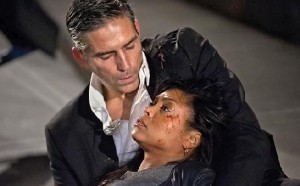Time and the OMG Moment
It’s hard to grasp the concept of turning points, especially when you’re writing them. They’re places in a narrative where the entire story turns in a new direction, where the character crosses a boundary he or she had never crossed before and can never return from. They can be small events or big ones, but they have to be events. We tend to see turning points as the impact they have on the character or the story instead of the event itself. But “This is when Andie realizes there are ghosts” is not a turning point. “Andie has a terrified conversation with ghosts” is a turning point. It’s a thing that happens, not an outcome. The impact of the turning point depends a lot on the outcome, but an additional factor in that impact is the timing of that turning point. If you spread turning points too far out, if a reader or a viewer has to wait too long to get that Oh-My-God moment that makes everything new, she’s just not going to care. Two TV shows had OMG moments in the past week, but only one of them pulled it off, and it was all because of timing.
SPOILER NOTE: If you didn’t see Person of Interest or The Mentalist this week, there are major, crucial spoilers below.
We’ve already talked about PoI‘s OMG moment: the death of a major and much-loved character at her moment of greatest triumph, two and half years after she was introduced. Joss Carter’s struggles with the corrupt police organization HR which had begun in the first season had escalated until she was driven by vengeance and righteous outrage to cross lines in this third season that she would never have crossed in the first. And she was so well written (and brilliantly acted) that when she crossed those lines–she shot people to death, she rescued a mob boss and stashed him in a safe house, she turned a corrupt cop into a lackey instead of turning him in (there’s a precedent for that in this show)–we were with her completely; she worked outside the law because the inside was rotten, and she brought all the bad guys down. She was magnificent, and then she died protecting somebody she loved, much too soon.
We weren’t ready to let go of Carter, there was too much we wanted to see her do. Much of the critical outcry–io9′s headline was “NO NO NO! ALL THE NO!”–was also critical appreciation: it was a brilliant decision on the part of the writers because the show needed a turning point. Carter had been chasing HR for three years; it was time that chase ended. But if it ended with Carter striding off into the sunset, victorious, there was nothing left for her to do; she’d achieved her story arc. More than that, that resolution wouldn’t do anything for the story itself. Instead Carter’s death makes everything new; nobody in that tight group of savior-complexes is going to come away from not saving the person they loved most without massive emotional damage. The turning point is Carter’s death; the impact is the rest of the season, reverberating for the rest of the series. I hate it that Carter’s gone, but I cannot wait to see what happens next. That’s a great turning point.
And then there’s The Mentalist. The main strength of this show is its cast, not just the CBI team but the supporting players that have gone kicking and screaming through its plots. The writing ranges from great to abysmal, but the cast stays solid, and that has kept me watching even though there have been any number of times I thought, “Why am I still watching this?” The problem here is that the people in charge know they have a hit on their hands, and they’re determined not to make any big changes so that the show will keep running. “People like this, let’s not risk changing it.” That way lies story death. The premise–that former con man Patrick Jane is on a vendetta to find the serial killer, Red John, who butchered his wife and daughter–was a strong one in the beginning, and there were stories that were riveting. One of them was the climax of the third season when Jane finally met Red John in a mall, sat down at a table and talked to him. Red John turned out to be everything a story-hungry viewer could have hoped for: charming, cruel, confident, and completely in control (Bradley Whitford nailed this one). Then Jane calmly shot him to death in the middle of the afternoon in that sunlit mall and then finished his tea. It was shocking and startling and satisfying, it pushed Jane past a boundary he couldn’t return from, it made the story new again. It was brilliant.
Except it wasn’t Red John. Over and over again, Jane closes in only to find a Red John minion instead. Those suckers were legion. Finally in Season Six, for crying out loud, he narrows the field to seven people in one episode, then six in the next episode, then five in the next (at which point I thought about e-mailing the show runner and saying, “Just e-mail me when you get to the end”), then four in the next, then three, and then down to one, except nobody believed that one was Red John because the writers were so in love with the fake-out so we needed another episode after that for another fake-out, and by the time Jane finally confronts the real Red John, I Just. Did. Not. Care. He strangles him to death on screen (well, you don’t see the deed, you just see Jane’s face, another cop-out) and it has zero impact. That’s because if you draw out the suspense too long, there is none. If you lie to the viewer too many times–It’s Red John! No, it’s not!–the reader stops believing in the story because she doesn’t trust the writer. “She’s lied to me before, I’m not going to believe her any more.” When the reader starts thinking about what the writer is doing, she’s not part of a story any more, she’s standing on the outside, glaring at the screw-up behind the curtain. The Mentalist should have stuck with Bradley Whitford bleeding into the mall tile and turned the story then. Everything after that was anti-climax petering off into a big yawn.
As I understand it, next week’s episode takes place two years after this week’s. The team has split up and moved on, transformed by the experience and by the loss of their professional family. That episode, the outcome of the turning point, I’ll be watching just to see what the writers do. I’m out of the story now, still think the cast is great (although I will not miss Mr. and Mrs. Rigsby when they go), so it’s curiosity that will bring me back. But the episode I will not miss under any circumstance is the new PoI, the aftermath of Carter’s death. That one I’m not just curious about, I’m on the edge of my seat. I’m worried about those people, I’m fascinated about what’s going to happen to them, I desperately want to know the next move in the story, I am still engaged in that narrative to the point of obsession.
Two turning points, two strong events, but only one has drawn me deeper into the story because of the timing. Changing your story and making it new is a huge risk; the only thing more dangerous is not changing it in time.





